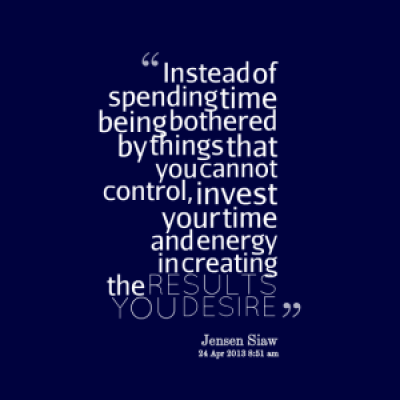This week I am going to talk about how you send you time and how it affects progress towards goals. This is a topic that keeps coming up (for me) from various sources and every time it does, I get more of an urge to discuss this topic here. So…here we go.
“How do you spend your time?”
Ask that question of a hundred different people and you are likely to get a hundred different answers. Some people may list every detail, others may just give a twenty-thousand-foot overview.
- Successful people have goals.
- Successful people have a plan to reach those goals.
- Successful people follow a process and their processes are habits.
Observations of Others
In a recent
blog post,
Dave Van Horn talks about a speaker at a recent investing summit who asked the question “What would you do if you were a billionaire?”
The answers were some form of the three below:
- “I would travel more.”
- “I would focus on my passion.”
- “I would give to charity.”
Dave then goes on to point out that “billionaire” status is not needed to achieve these goals, as evidenced by the speaker, (not a billionaire), only that you budget your time as you do your money to its best possible use. Don’t waste your time doing things that won’t move you forward. You can pay someone to take care of that for you if your time would be better spent being effective.
He then relates how Tony Robbins asks similar questions:
- What is an extraordinary life for you? – Hopefully this is something that you can achieve in the next six to twelve months.
- What is preventing this from happening already? – What story do you give as an excuse for not having achieved it already?
- What needs to change now? – This brings it back to taking action.
This may sound familiar. It is similar to what I outlined in how to resolve overspending.
Once you have set a goal, identified what is stopping you from achieving that goal, and put a plan in place to change things your goal, things may still not happen perfectly.
Life will always throw you curveballs. Our initial reaction is to get emotional and point to all the reasons why we are failures. We can come up with lots of feelings on the subject, but in reality, over the long term, they don’t make much of a difference in the long run. Life goes on.
The way we can get through this is to put it in perspective. Learn from failure. Defeat your emotions with logic. What important things are you missing because you choose to worry versus logically evaluating the facts? Just because you are in control of your emotions does not mean you don’t feel them, just that you are taking care of business so you can deal with your emotions at an appropriate time.
By thinking clearly rather than getting caught up in emotions, General Eisenhower, in WW2, was able to determine a way to defeat the German Blitzkrieg, a battlefield strategy that involved throwing everything they had at the allied forces in a single attack. It was scary and worked in lots of battles, with allied forces so surprised, shocked, and overwhelmed by the speed and ferocity of the attack, that they just gave up.
General Eisenhower realized that the Germans were putting everything they had into the attack, leaving their flanks and rear unprotected. His approach let the Germans attack, but held groups back to flank the German attack, thus surrounding & defeating them.
Here are some quotes that reflect this approach that I find helpful:
“What doesn’t kill you, only makes you stronger!” – Jean-Baptiste Emmanuel Zorg (Antagonist from The Fifth Element)
He wasn’t the originator but is as good an attribution as any. This means that you learn from your mistakes. Dealing with difficulty helps you to become more resilient, more anti-fragile.
“I must not fear. Fear is the mind-killer. Fear is the little-death that brings total obliteration. I will face my fear. I will permit it to pass over me and through me. And when it has gone past I will turn the inner eye to see its path. Where the fear has gone there will be nothing. Only I will remain.” – Frank Herbert, from the book Dune.
It is OK to be scared, but don’t run from it. Face your fears. Once you face your fears, they have little power over you.
“Our actions may be impeded, but there can be no impeding our intentions or dispositions. Because we can accommodate and adapt. The mind adapts and converts to its own purposes the obstacle to our acting. The impediment to action advances action. What stands in the way becomes the way. – Marcus Aurelius – Holiday, Ryan. The Obstacle Is the Way: The Timeless Art of Turning Trials into Triumph (p. 1). Penguin Publishing Group. Kindle Edition.
This is similar to the “What doesn’t kill you” quote but goes a little deeper and touches on something that doesn’t seem common these days…the idea that by facing hardship, you grow. In fact, it is the reason for the title of Ryan’s book, “The Obstacle is the way”.
Do the uncomfortable things, if it will further your goals.
Grow from those experiences, so that next time, you either know how to handle it already, or if it is a big issue, avoid it altogether.
Learn from mistakes.
Budget your time.
Budget your money.
Grow, as a person and as a leader.
And, as always, let me know what you think in the comments. Ask questions, tell your story.
If you like my posts, please share them with others and subscribe to this blog.
Like this:
Like Loading...
Related
Discover more from The Clint Galliano
Subscribe to get the latest posts to your email.



How can I not love a post that references Eisenhower, The Fifth Element, and Dune?